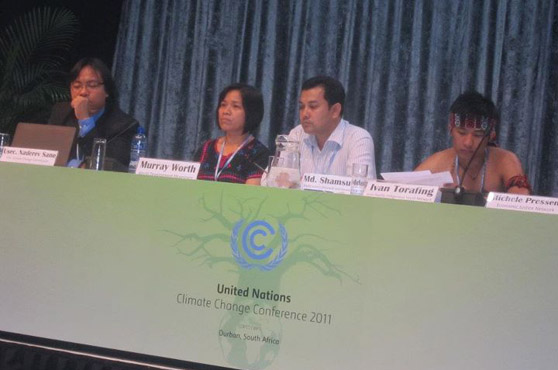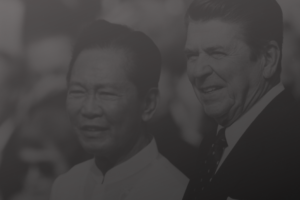DURBAN, South Africa (December 4, 2011)—UN Independent Expert on Foreign Debt and Human Rights Dr. Cephas Lumina yesterday called on the world’s leaders negotiating the future of the Green Climate Fund to ensure that climate financing is indeed “new and additional” money that would help those most impacted by the changing climate to realize their fundamental human rights.
[[{“type”:”media”,”view_mode”:”media_large”,”fid”:”99″,”attributes”:{“alt”:””,”class”:”media-image”,”height”:”233″,”style”:”width: 310px; height: 233px; margin: 10px; float: right;”,”typeof”:”foaf:Image”,”width”:”310″}}]]
Dr. Lumina issued the call at a side event of the 17th Conference of Parties (COP17) of the United Nations Framework Convention on Climate Change (UNFCCC) held here in Durban, titled “Improving Development Effectiveness in Climate Financing: Challenges and Opportunities”.
Vice-Minister Naderev Sano of the Philippine Climate Change Commission stressed the need to respect the firewall with climate finance, and emphasized that climate finance is not development assistance, i.e., it is neither aid nor a donation. It is an acknowledgement of the historical responsibility of developed countries, well in keeping with the established principle of “common but differentiated responsibility.”
Meanwhile, Md. Shamsuddoha of the Bangladesh-based Participatory Research and Development Initiative said that lessons learned in decades of aid reform advocacy provide valuable lessons with regard to ensuring democratic ownership and mutual accountability that is founded on governments’ accountability to its people.
On the matter of governance of the Green Climate Fund, Murray Worthy of the World Development Movement said that “the World Bank is not the most appropriate channel for future climate finance,” and warned of the threat of climate financing becoming yet another debt-creating instrument.
Climate financing should not be used to trample upon human rights, especially indigenous peoples’ rights, said Ivan Torafing of the Asia Pacific Indigenous Youth Network. “We contributed the least to the climate crisis, and yet we are being blamed for deforestation. With REDD and the promise of financing, so-called reforestation projects are being implemented and we are driven away from our ancestral lands,” he added.
[[{“type”:”media”,”view_mode”:”media_large”,”fid”:”100″,”attributes”:{“alt”:””,”class”:”media-image”,”height”:”360″,”style”:”width: 350px; height: 263px;”,”typeof”:”foaf:Image”,”width”:”480″}}]]
Co-organizers of in the side event included IBON International, Peoples’ Movement on Climate Change (PMCC), Reality of Aid, Peoples Coalition on Food Sovereignty (PCFS), Pesticide Action Network Asia Pacific (PAN AP), VOICE, Asia Pacific Indigenous Youth Network (APIYN), and Coastal Development Partnership (CDP).



